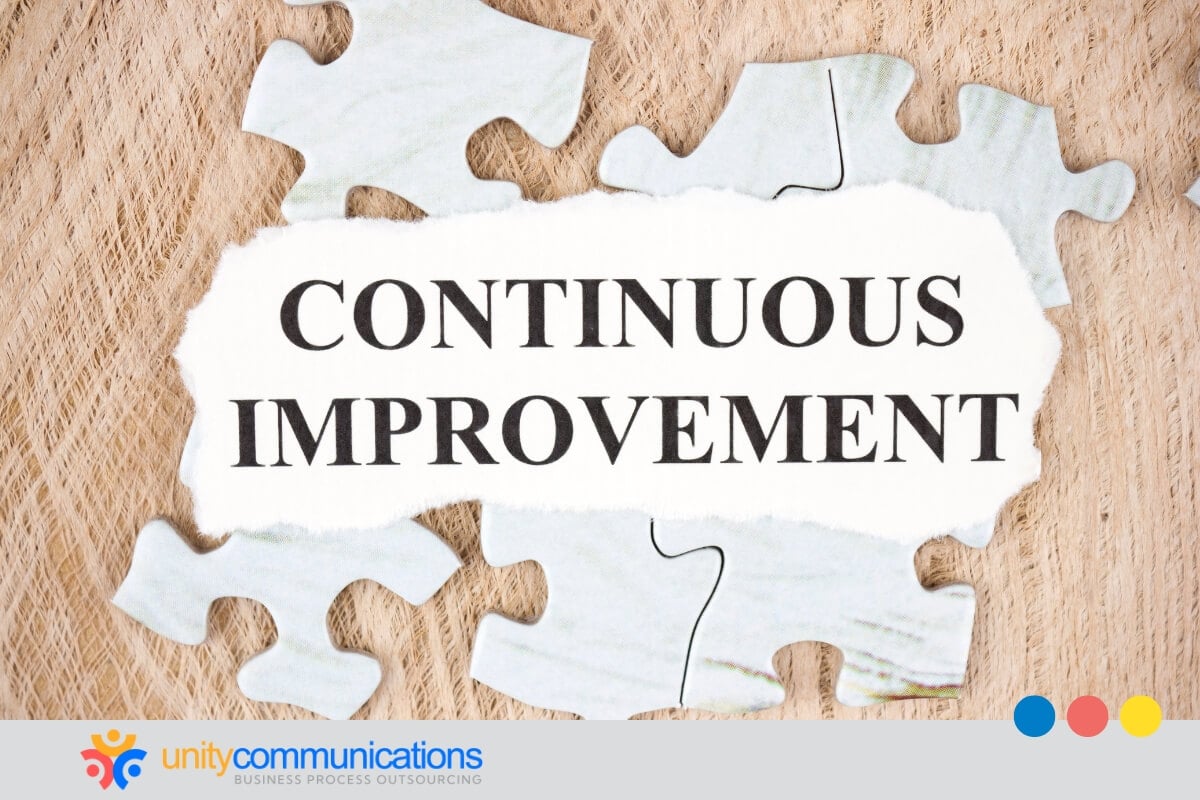IN THIS ARTICLE
Table of Contents
Complying with regulatory standards is critical to avoid reputational damage and hefty fines for violations. However, companies grapple with increasingly complex industry laws, necessitating robust monitoring systems to avoid legal pitfalls and maintain operational integrity.
Business process outsourcing (BPO) is a strategic solution to this challenge. Leveraging specialized expertise and advanced technologies streamlines oversight, reduces administrative burdens, and ensures adherence to regulatory requirements.
Read on to learn how outsourcing can supplement compliance monitoring processes with tools and support to navigate regulatory landscapes confidently and efficiently.
How outsourcing simplifies and enhances compliance monitoring

Compliance monitoring is crucial for businesses. It promotes adherence to regulatory requirements, legal standards, and internal policies. It helps prevent violations that could lead to severe financial penalties, legal repercussions, or reputational damage.
Effective compliance management safeguards your company against potential lawsuits and fines and upholds ethical practices and operational integrity. Regularly assessing and auditing compliance helps identify and address vulnerabilities before they escalate.
However, what is BPO’s role in compliance monitoring? It provides access to dedicated compliance professionals well-versed in regulatory requirements and best practices. BPO providers leverage sophisticated tools to automate compliance processes for accuracy and consistency.
Compliance monitoring involves a systematic approach to ensuring that an organization adheres to regulatory requirements and internal policies. BPO companies apply several best practices to simplify and enhance outsourced compliance monitoring functions.
Here are some ways outsourcing compliance monitoring helps:
- Define compliance requirements. Your BPO partner works with you to identify and document the relevant laws, regulations, and internal policies your organization should follow. These requirements include industry-specific rules and other standards applicable to the business.
- Develop compliance policies and procedures. Your BPO partner creates comprehensive policies and procedures that outline how to achieve and maintain compliance. The plan includes detailed instructions for employees and management on regulatory compliance expectations and practices.
- Implement compliance controls. The BPO team establishes the necessary controls and processes to adhere to compliance requirements. Examples include internal controls, automated systems, and other mechanisms to monitor and enforce compliance.
- Conduct training and awareness programs. The BPO firm helps train internal employees and stakeholders about compliance requirements, policies, and procedures. Regular training ensures everyone understands their roles and responsibilities in compliance activities.
- Monitor and review compliance. Outsourced compliance services include monitoring compliance through regular audits, reviews, and assessments. This step involves tracking compliance metrics, reviewing documentation, and inspecting processes to determine whether they align with regulatory standards.
- Identify and address non-compliance. Your BPO partner detects any instances of non-compliance or deviations from established policies through continuous monitoring. They help investigate the root causes and devise a plan to rectify them.
- Document compliance efforts. Your external team maintains detailed records of compliance activities, audits, training sessions, and corrective actions. Proper documentation provides evidence of full compliance and supports accountability.
- Report and communicate. Outsourcing compliance monitoring also helps regularly report compliance status to relevant bodies, including management, regulators, and auditors. Transparent communication keeps everyone informed and demonstrates a commitment to compliance.
- Practice continuous improvement. A reliable partner uses feedback and insights from monitoring activities to continually improve compliance processes and controls. This emphasizes a culture of ongoing improvement and adaptability to regulatory changes and emerging risks.
Other benefits of outsourcing compliance monitoring

According to 35% of risk executives, compliance and regulatory risk are the biggest challenges to business growth potential.
Effective compliance monitoring fosters trust with stakeholders, including customers, investors, and regulatory bodies. It demonstrates a commitment to maintaining high standards and following the law. Eventually, a proactive approach to compliance monitoring sustains business success and long-term viability.
Outsourcing compliance monitoring offers numerous benefits that can significantly enhance your company’s ability to manage regulatory requirements.
Here are other BPO advantages to consider:
Implementing advanced compliance technologies
One significant benefit of outsourcing compliance monitoring is the implementation of advanced compliance technologies. BPO providers have access to state-of-the-art compliance tools and systems. They can automate compliance checks, manage documentation, and track regulatory changes.
Automated systems reduce the risk of human error and ensure that compliance checks are performed consistently and in real time. Additionally, these technologies can generate comprehensive reports and analyses, provide valuable insights into compliance performance, and identify potential issues before they become critical.
Customizing solutions to fit your business needs
Outsourcing compliance monitoring offers the distinct advantage of customizing solutions to fit business needs. Unlike off-the-shelf options, the outsourcing partner can tailor their services to align with your unique regulatory requirements, industry standards, and operational nuances.
Customization ensures compliance monitoring systems and processes are effective and seamlessly integrated into your company’s framework. It also addresses particular compliance challenges, whether adapting to industry-specific regulations or scaling with organizational growth.
Establishing reporting mechanisms and continuous monitoring
Outsourcing compliance monitoring significantly enhances robust monitoring and continuous oversight. BPO providers implement sophisticated reporting systems that deliver timely and detailed insights into compliance status, trends, and potential issues.
The system can generate comprehensive reports regularly, informing stakeholders of compliance performance and emerging risks.
Furthermore, continuous monitoring promotes real-time tracking of compliance activities and regulatory changes. Leveraging external expertise ensures compliance monitoring is not a sporadic task but an ongoing process supporting early detection of issues and prompt corrective actions.
Reducing expenses and increasing cost savings
Outsourcing offers up to 70% cost reduction. By transferring tasks related to compliance monitoring to an external team, you can avoid the substantial expenses associated with maintaining an in-house compliance team.
Outsourcing allows you to leverage the expertise of the external partner at a fraction of the cost of developing such capability internally. Additionally, the BPO firm’s use of advanced compliance tools and streamlined processes can lead to greater operational efficiency and reduced tech investment.
The bottom line

Outsourcing compliance monitoring helps organizations establish a robust framework that helps mitigate risks, ensures adherence to regulations, and promotes operational integrity.
BPO companies deliver more streamlined, effective, and reliable compliance monitoring services, helping businesses navigate regulatory landscapes more easily and confidently.
Ready to unlock the benefits of outsourced compliance monitoring? Let’s connect today!





